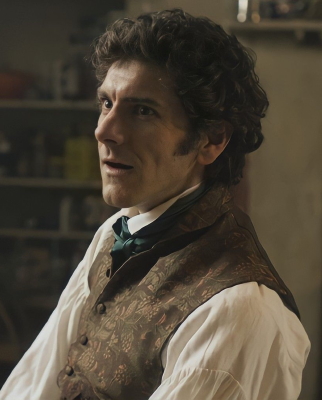



What do these four have in common? Nothing, other than all appearing in this post.
As you'll know from my last post, I've been playing with ChatGPT, the better-than-you-might-expect AI chatbot that Microsoft are getting behind (I'm on the waiting list to try Google's Bard AI).
Since yesterday was World Poetry Day, I asked ChatGPT if it could write a sonnet about French actress Estelle Skornik. And if you're thinking that names rings a vague bell, she was briefly famous in the 90s for playing Nicole in those Renault Clio ads. Anyway, here's what the bot wrote, literally in a couple of seconds:
Fair Estelle, with eyes so bright and bold,
A beauty that inspires both awe and grace,
Your presence on the screen is a sight to behold,
A talent that few can ever hope to trace.With every line you speak, your voice doth flow,
Like honey, sweet and rich and full of life,
Your passion for your craft doth clearly show,
And stirs within us all a yearning strife.Your beauty, like a rose in full bloom,
Shimmers with a radiance that cannot be ignored,
And captivates us all in its sweet perfume,
A sight that we shall always adore.So here's to you, Estelle, with love and admiration,
May your star forever shine with such brilliance and dedication.
So what do we think? I mean, yes, technically it is a sonnet - fourteen lines, rhyming, expressing romantic love or infatuation - and it is about Estelle (an Estelle at least, rather than necessarily Mlle Skornik) ... but it's awful, isn't it? I mean, I'm no expert but this feels like the kind of "moon, June and coffee spoons" rhyming that you'd find in a greetings card, or at best something Thomas from Ghosts would write. But is it any better or worse than arguably the most famous sonnet in the English language?
My mistress' eyes are nothing like the sun;
Coral is far more red than her lips' red;
If snow be white, why then her breasts are dun;
If hairs be wires, black wires grow on her head.I have seen roses damasked, red and white,
But no such roses see I in her cheeks;
And in some perfumes is there more delight
Than in the breath that from my mistress reeks.I love to hear her speak, yet well I know
That music hath a far more pleasing sound;
I grant I never saw a goddess go;
My mistress, when she walks, treads on the ground.And yet, by heaven, I think my love as rare
As any she belied with false compare.
Yeah, that's better, isn't it? That Shakespeare bloke was alright, wasn't he?
The thing is, though, this AI lark: it's in the kindergarten right now. Think how quickly we went from the Wright brothers to Apollo XI. Think how quickly we went from a Nokia 3310 to the iPhone. Now think how quickly AI will go from Hallmark poetry to Shakespeare...
From one Bill to another. Bill Gates is in the news today, suggesting that AI is the most important tech advance in decades. For what my opinion is worth (nought), I think he's right. And whilst Gates cautions that governments should work with his industry to "limit the risks" of AI, he is broadly optimistic about the benefits of this new tech. I worry more though. For every positive application (research, medicine) I see more negatives: you think algorithms are bad now, just wait 'til some commercial AI thinks it knows you better than you know yourself. And worse than the monetisation will be the militarisation. Gah.
Let's end with a song. The aforementioned Sonnet 130 gave this post its title, but also gave Sting a line for a song and the title for an album in 1987. Now Sting irks a lot of people, almost as much as Bono, but he's done some good stuff, and I'm not just talking about his time in the Rozzers. Anyway, to prove that I don't have a hip bone in my body, other than my pelvis, here's an excellent version of that song, Sister Moon, by Gordon Sumner and his jazzy mates. Until such time as AI can play the drums with the intense joy and precision of Billy Kilson in this, maybe we can rest easy.

I think the bloke on the right in that video is thinking, "I'm glad I'm not in the same room as Sting."
ReplyDeleteThere's no sign of a volta in your AI sonnet, so it's breaking one of the main sonnet rules. But I'm sure they'll programme that in at some point. It's still the death of the soul though...
I think the absence of a volta is the least of its problems. Death of the soul is right.
Delete